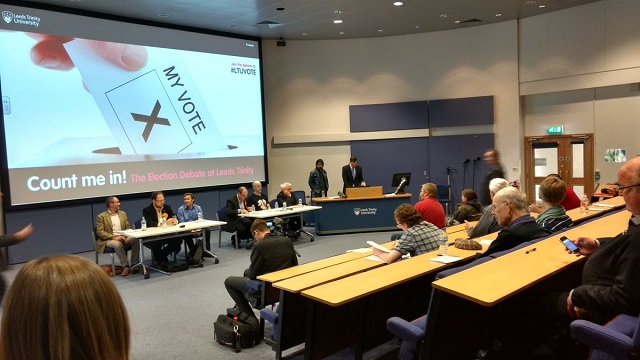Political candidates hoping to represent Pudsey, Horsforth and Aireborough held a lively debate at Leeds Trinity University today, writes Alex Worrall and Matthew Barks.
Representatives from the Conservative Party, the Green Party, the Liberal Democrats, the Labour Party, the Yorkshire Party and an Independent candidate set out their political stalls before answering questions posed by the audience.
The former MP for the constituency, Conservative Stuart Andrew, was unable to attend and so a Conservative representative, Andrew Martin, filled his place.
First to speak was Yorkshire Party candidate Bob Buxton. Buxton serves on Rawdon Parish Council and his agenda focuses on environmental and transport issues.

Buxton opposes all greenbelt housing and would use the ‘94 Brownfield sites rated as suitable’ to build 25,000 new homes.
He also supports the building of new rail lines and railway stations, including a station at Leeds Bradford International Airport.
He proposed an expert-led transport review to assess Leeds’ situation and also thinks a Leeds-Bradford tram system should be considered.
Buxton’s main proposal is to replace Leeds and Bradford City Councils with smaller district councils, meaning local councils stay accountable for their actions.
The Liberal Democrat candidate, Alisdair McGregor, made very clear that he was anti-Brexit from the off-set.
McGregor told the audience that the Lib-Dems would challenge Brexit until it happened. He stated:
“Brexit will ruin this country. It will ruin the future of youth and it will ruin the world as a whole.”
He talked of Labour’s previous failings with tuition fees, stating there were no tuition fees before Labour introduced them in 1998.
This led Labour candidate Ian McCargo to challenge McGregor saying that pre-2010 the Lib-Dems had fully voted against tuition fees. He said:
“The Lib-Dems talking about tuition fees is farcical. The Lib-Dem candidates in 2010 signed a pledge to never support tuition fees and they turned round shamelessly as soon as they got into bed with the Tories and voted in favour on tuition fees.”
Upon becoming a coalition government with the Tories, the Lib-Dems had co-signed an act which trebled tuition fees to £9,000.
McCargos’s main focus was on economic inequality, where he used his daughter’s current situation as an example. He spoke of unaffordable housing, a rise in living costs and the wages of younger people.
Martin Hemingway, of the Green Party, said he wanted to abolish tuition fees. Hemingway was a Leeds City Councillor for 12 years.
He used to be a part of the Labour Party but, following the invasion of Iraq under Tony Blair, decided the Green Party was for him.
Michael Walton, who is standing as an Independent candidate, wants better protection for whistleblowers. He believes that if there’s a whistleblower protection, then MPs will be held account and therefore be more cautious with their spending.
The audience vote
A ballot was put forward to the audience before and after the debate. Before the debate Labour were outright leaders with 55 per cent of votes going their way.
The Conservative Party received 21 per cent of votes, The Green Party and the Yorkshire Party both received 7 per cent of votes and the remaining 6 per cent was split equally between the Lib-Dems and the Independent candidate.
After the debate, Labour’s lead had fallen to just 34 per cent of the votes. The Green Party managed to treble their votes, capturing 26 per cent of the votes. The Yorkshire Party also doubled their original tally, putting them in third place.
The Conservatives went from 11 votes to seven and the Independent candidate lost half of his original vote. The Lib Dems gained one extra vote.

What an excellent write up. Thank you for this.
Greens taking votes from Labour to let the Tories in? Repeat that at the General Election and see where it gets us!